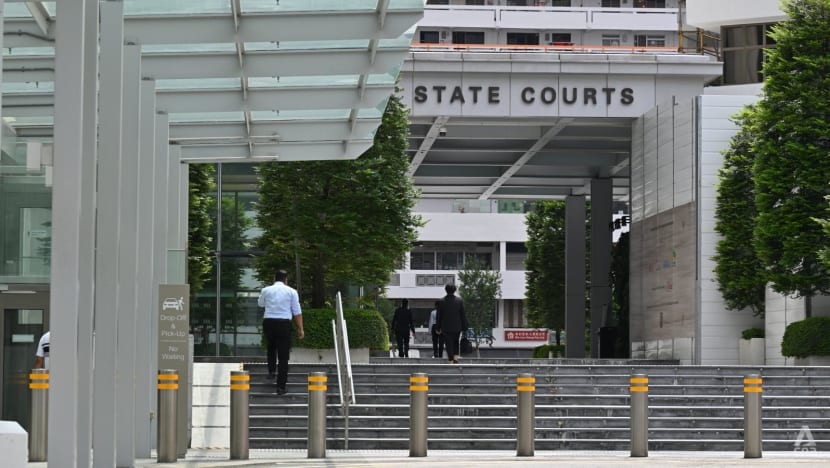2 men acquitted of giving bribes to LTA director after judge finds CPIB statements 'inaccurate, unreliable'
District Judge Soh Tze Bian found that the prosecution had failed to prove its case against the two men beyond a reasonable doubt.

File photo of the State Courts of Singapore (File photo: CNA/Jeremy Long)

This audio is generated by an AI tool.
SINGAPORE: Two men implicated in a corruption case involving a former Land Transport Authority (LTA) director were acquitted of their charges on Friday (Oct 11), after the trial judge found that the statements taken by the Corrupt Practices Investigation Bureau (CPIB) had been unreliable and inaccurate.
Mr Pay Teow Heng and Mr Pek Lian Guan had both been charged alongside ex-LTA deputy group director Henry Foo Yung Thye in July 2020 over alleged bribes to Foo.
Mr Pay, 56, was the director of Tiong Seng Contractors, while Mr Pek, 59, was the company's managing director. Each had claimed trial to two charges under the Prevention of Corruption Act.
Mr Pay was accused of giving S$350,000 (USD$267,848) to Foo over two occasions in 2017 and 2018 to advance Tiong Seng's business interest with LTA in respect of contracts, while Mr Pek was accused of abetting Mr Pay.
Mr Pay was represented by Wong Partnership senior counsel Tan Chee Meng, Paul Loy and Samuel Navindran, while Mr Pek was defended by Drew & Napier's senior counsel Cavinder Bull, Jonathan Yap, Chua Xyn Yee and Erin Chua Ying Ying.
CPIB OFFICERS' CONDUCT A FACTOR
Delivering a 50-page verdict on Friday, District Judge Soh Tze Bian listed three key issues he considered in coming to the two men's acquittal.
One of these issues involved the conduct of CPIB officers who had recorded the two men's statements. The judge ultimately found these statements to be inaccurate, unreliable and unsafe to rely on.
One of the CPIB officers was investigating officer (IO) Chris Lim, who had taken Mr Pay's second statement.
Mr Lim had admitted during the trial that he approached the interview with Mr Pay with a "preconceived notion" that he had committed some form of offence.
Judge Soh found that Mr Lim had a "blatant disregard for the truth" when recording Mr Pay's second statement, and the IO's approach had been "mischievous and conveniently selective" as he had recorded parts of Mr Pay's statements that could be construed as incriminating, while omitting evidence that could exonerate him.
"As submitted by Pay's counsel, the procedural safeguards were meaningless in the face of IO Chris Lim's conduct based on his own evidence which unfortunately demonstrated him to be happy to stretch the truth and the prosecution has offered no explanations for his conduct."
Similarly for Mr Pek, the conduct of IO Jeffrey - whose surname was not given - in the statement recording process had been a factor.
Judge Soh found that Mr Pek's first statement recorded by Mr Jeffrey had contained repeated self-incriminating remarks, which were "not a faithful representation" of what Mr Pek had said, but indicated an attempt to emphasise his culpability.
The IO had also used a "cut-and-paste method" to compile the statement, suggesting that Mr Pek's responses might not have been accurately reflected.
"Pek's first statement appears to be more a product of IO Jeffrey's authorship than an accurate account of what Pek actually communicated. This is because IO Jeffrey took several liberties in constructing the statement," said Judge Soh.
By the IO's own admission, he had drafted Mr Pek's first statement with the intention of framing him, focusing almost exclusively on recording information that showed his culpability, noted the judge.
Mr Jeffrey admitted during cross-examination that he had drafted key parts of Mr Pek's first statement in a way that gave the impression that Mr Pek was the one who came up with the idea of taking staff loans, the judge noted.
"This admission indicates that IO Jeffrey intentionally worded portions of the statement to portray Pek as the initiator of the scheme, rather than accurately documenting what was actually communicated by Pek during the interview," said the judge.
CNA has contacted CPIB for more information.
HENRY FOO'S TESTIMONY
Another key point the judge considered was how the recipient of the bribes, Foo, had testified that there was never any quid pro quo asked for by Mr Pay and Mr Pek.
Foo was called as a prosecution witness, and the Judge determined that the prosecution was bound by the evidence of its own witness.
Foo's testimony had been in line with Mr Pay and Mr Pek's evidence that the loans were given "innocently and not corruptly".
He had consistently maintained that he had no corrupt intent when he requested and received the loans and did not believe that Mr Pay or Mr Pek had any corrupt intent either, noted the judge.
Mr Pay testified that the loans extended to Foo were personal loans, intended to help Foo as a friend and out of goodwill, rather than to benefit his company, while Mr Pek testified in a similar vein.
The judge also noted that the prosecution had failed to impeach Foo or challenge his credibility, leading the judge to place even greater weight on his evidence.
Judge Soh rejected the prosecution's argument that Foo's admission of feeling "corrupted" and his guilty plea should be interpreted as an acceptance of his own corrupt intention, and a belief that Mr Pay or Mr Pek were corrupt.
"Foo's guilty plea was not an acceptance of corruption but a pragmatic decision to 'cut short the pain'," Judge Soh said, noting how Foo testified that he had pleaded guilty to avoid further distress, rather than to acknowledge corrupt behaviour.
Foo was sentenced to five-and-a-half years' jail in Sep 2021, after being found guilty of taking S$1.24 million in bribes.
The judge also rejected the prosecution's attempt to rely on WhatsApp messages exchanged between Mr Pay and Foo to show that the latter was beholden or indebted to Mr Pay, finding that arguments by the prosecution were not borne out.
In conclusion, Judge Soh found that the prosecution had failed to prove its case against the two men beyond a reasonable doubt and ordered a discharge amounting to an acquittal for both.
After the hearing, the Attorney-General’s Chambers told CNA it was studying the judgment and would "decide on the next course of action thereafter".
Apart from Foo, at least four other men have been jailed in relation to the case. These are Daewoo Engineering & Construction project director Kim Young-gyu and project manager Ro Sung-young, ex-director of Tritech Engineering and Testing (Singapore) Cai Jungang and ex-director of MEPT Engineering Zhang Xihu.















